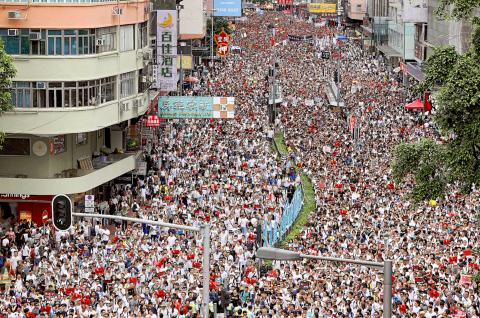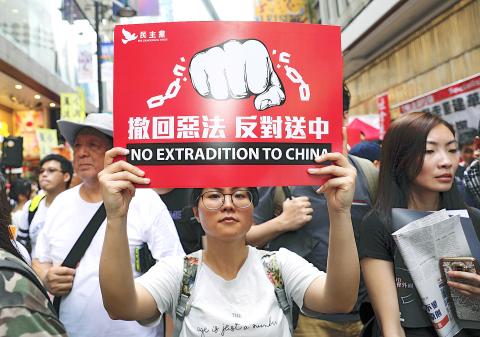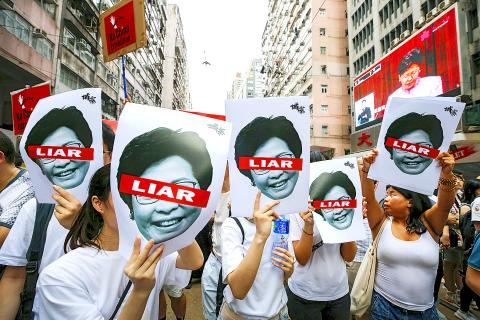Huge crowds yesterday thronged Hong Kong as anger swelled over a plan to allow extradition to mainland China, a proposal that has sparked the biggest public backlash against the territory’s pro-Beijing leadership in years.
Tens of thousands of people marched in blazing summer heat through the cramped streets of the territory’s main island in a noisy, colorful demonstration calling on the government to scrap its planned extradition law.
Hong Kong’s leaders are pushing a bill through the legislature that would allow extraditions to any jurisdiction with which it does not already have a treaty — including China for the first time.

Photo: AP
Coffee shop owner Marco Ng said he was closing his store to join the march.
“Our city matters more than our business,” the 26-year-old said. “If we don’t speak out, then there’s no way that the government will listen to our concerns.”
“The people’s voices are not being heard,” 18-year-old student Ivan Wong said. “This bill will not just affect Hong Kong’s reputation as an international finance center, but also our judicial system. That has an impact on my future.”

Photo: AP
The proposed law has sparked an opposition that unites a wide demographic, setting off the largest demonstrations since 2014 pro-democracy protests brought parts of the territory to a standstill for two months.
In the past few weeks lawyers have held sombre marches dressed in black, anonymous senior judges have given critical media interviews and the territory’s two main legal groups have urged a rethink.
Business figures are also rattled, with multiple chambers of commerce and commercial groups expressing alarm, adding to criticism from the US, Canada, former colonial power Britain and many European governments.

Photo: AP
Online petitions have been gathered by groups as diverse as stay-at-home moms, students, nurses and horse-racing fans.
Hong Kong’s leaders, who are not popularly elected, have said the law is needed to plug loopholes and stop the territory being a bolthole for Chinese fugitives.
They have said dissidents and critics would not be extradited, and have urged quick passage of the bill to extradite a Hong Kong man who is wanted in Taiwan for murdering his girlfriend.
However, critics fear the law would entangle people in China’s opaque and politicized court system and have said the government is using the Taiwan case as a Trojan horse.
The proposed law has been fast-tracked through the Hong Kong Legislative Council, which is dominated by pro-Beijing members and would on Wednesday receive its second reading.
The government has said it plans to have the law on the statute book by late next month.
Previous sessions in the legislature have descended into chaos, with rival lawmakers scuffling.
The march was seen by organizers as an attempt to showcase how wide the opposition to the bill is ahead of the second reading.
The backlash creates a headache for Hong Kong Chief Executive Carrie Lam (林鄭月娥), who has staked her political reputation on the bill passing.
Pushing through the legislation could spark more protests or even a return to the unrest of 2014 — but backtracking might embolden opponents and anger Beijing.
Several senior Chinese Communist Party leaders have voiced support for the bill.

MAKING WAVES: China’s maritime militia could become a nontraditional threat in war, clogging up shipping lanes to prevent US or Japanese intervention, a report said About 1,900 Chinese ships flying flags of convenience and fishing vessels that participated in China’s military exercises around Taiwan last month and in January last year have been listed for monitoring, Coast Guard Administration (CGA) Deputy Director-General Hsieh Ching-chin (謝慶欽) said yesterday. Following amendments to the Commercial Port Act (商港法) and the Law of Ships (船舶法) last month, the CGA can designate possible berthing areas or deny ports of call for vessels suspected of loitering around areas where undersea cables can be accessed, Oceans Affairs Council Minister Kuan Bi-ling (管碧玲) said. The list of suspected ships, originally 300, had risen to about

DAREDEVIL: Honnold said it had always been a dream of his to climb Taipei 101, while a Netflix producer said the skyscraper was ‘a real icon of this country’ US climber Alex Honnold yesterday took on Taiwan’s tallest building, becoming the first person to scale Taipei 101 without a rope, harness or safety net. Hundreds of spectators gathered at the base of the 101-story skyscraper to watch Honnold, 40, embark on his daredevil feat, which was also broadcast live on Netflix. Dressed in a red T-shirt and yellow custom-made climbing shoes, Honnold swiftly moved up the southeast face of the glass and steel building. At one point, he stepped onto a platform midway up to wave down at fans and onlookers who were taking photos. People watching from inside

Japan’s strategic alliance with the US would collapse if Tokyo were to turn away from a conflict in Taiwan, Japanese Prime Minister Sanae Takaichi said yesterday, but distanced herself from previous comments that suggested a possible military response in such an event. Takaichi expressed her latest views on a nationally broadcast TV program late on Monday, where an opposition party leader criticized her for igniting tensions with China with the earlier remarks. Ties between Japan and China have sunk to the worst level in years after Takaichi said in November that a hypothetical Chinese attack on Taiwan could bring about a Japanese

STREAMLINED: The dedicated funding would allow the US to transfer equipment to Taiwan when needed and order upgraded replacements for stockpiles, a source said The US House of Representatives on Thursday passed a defense appropriations bill totaling US$838.7 billion, of which US$1 billion is to be allocated to reinforcing security cooperation with Taiwan and US$150 million to replace defense articles provided to the nation. These are part of the Consolidated Appropriation Act, which the US House yesterday passed with 341 votes in favor and 88 against. The act must be passed by the US Senate before Friday next week to avoid another government shutdown. The US House Committee on Appropriations on Monday unveiled the act, saying that it allocates US$1 billion for the Taiwan Security Cooperation Initiative